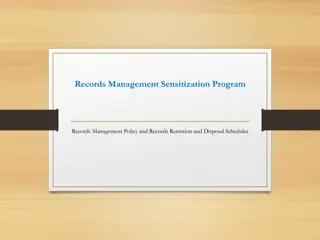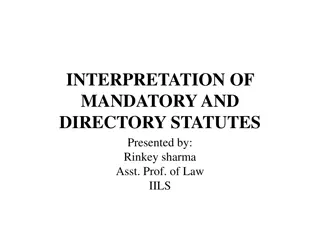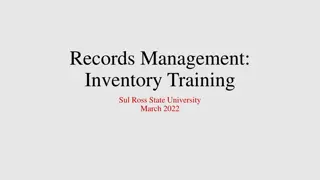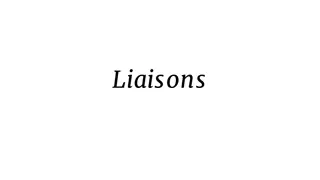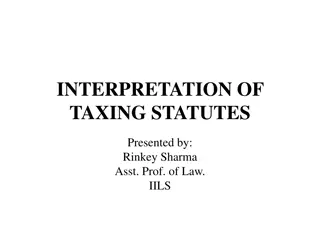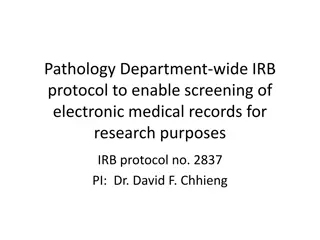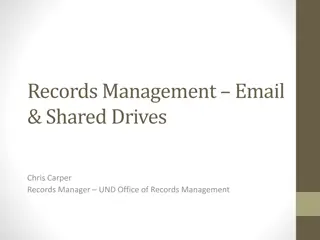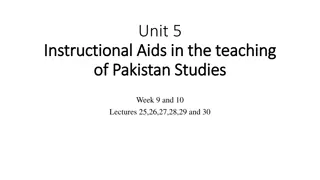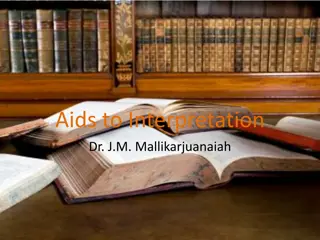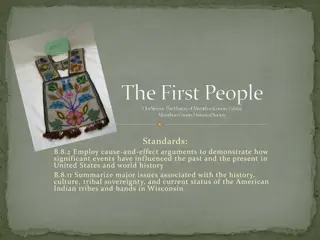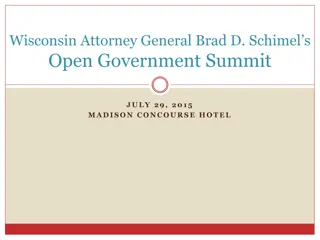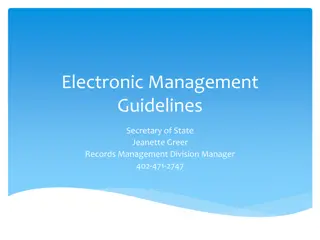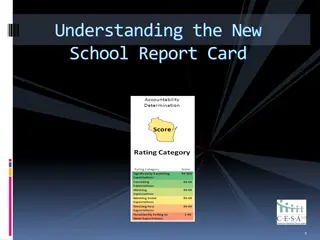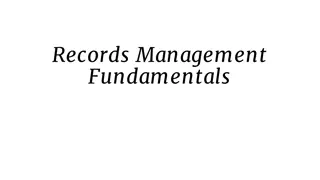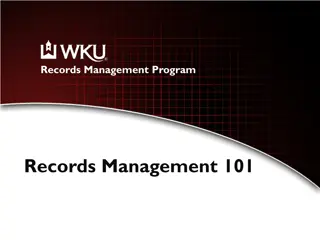Analysis of Wisconsin Statutes in Finding Aids for Institutional Records
In this analysis, various finding aids for institutional records in Wisconsin are examined, highlighting the use of state statutes as legal justifications for privacy and access restrictions. The study delves into the consequences and implications of citing irrelevant statutes and showcases the distribution of different statutes across the finding aids.
Download Presentation

Please find below an Image/Link to download the presentation.
The content on the website is provided AS IS for your information and personal use only. It may not be sold, licensed, or shared on other websites without obtaining consent from the author. Download presentation by click this link. If you encounter any issues during the download, it is possible that the publisher has removed the file from their server.
E N D
Presentation Transcript
Twenty-eight finding aids Access restrictions area: Wisconsin Statute/s State and county institutional records owned and maintained by the Wisconsin Historical Society State and county sanitoriums & mental hospitals County asylums Prisons & youth detention centers Poor farms State institutions for the cognitively & physically challenged Wards of the state who could be adopted
Archives course assignment Article in archives journal: Wisconsin School for Girls: Inactive Case Files Listed Wisconsin Statute 48.396(2) in article Legal justification for online access restrictions & privacy Read statute>questioned relevancy Records owned and maintained by the record creating agency, not the WHS What are the consequences and implications of listing in finding aids irrelevant state statutes as legal justifications for privacy and access protocols?
Content analysis Searched for finding aids through UWM Archives Department finding aids portal Used key words asylum & insane Found twenty-eight finding aids for institutional records that lists Wisconsin statutes Examined statutes online Wisconsin State Legislature website https://docs.legis.wisconsin.gov/statutes/ Entered specific statute in search box Used Microsoft Excel to record data
Wisconsin Statutes Twenty out of twenty-eight finding aids (72%) cite Statute 51.30 Eight cite Statute 146.82 (29%) Five cite Statute 48.78 (18%) Five cite Statute 49.001 (18%) Over 100%: each finding aid lists more than one statute Dependent on type of record
Statute titled Records Under Chapter 51 titled State Alcohol, Drug Abuse, Developmental Disabilities and Mental Health Act Finding aids Northern Wisconsin Center for the Developmentally Disabled: Administrative Records Winnebago County Asylum, County Home and Poor Farm Records Wisconsin. Division of Corrections: Case Files
Northern Wisconsin Center for the Developmentally Disabled: Administrative Records Patient information in Series 2201 is confidential per section 51.30, Wis. Stats. These confidential materials are found in Volumes 1-19 and Boxes 6-8 and 20-26. Researchers wishing to use these confidential materials should consult the Archives reference staff if the records are more than 75 years old, or the Department of Health and Social Services if less than 75 years old. Winnebago County Asylum, County Home and Poor Farm Records Records that identify individuals receiving care or aid are confidential under s. 51.30 and 49.001, 2005-06 Wis. Stat. Researchers wishing to use these records should consult the reference archivist. Portions of these records are confidential under sections 51.30 and 146.82, Wisconsin Statutes, relating to patient health care and mental illness treatment records. Wisconsin. Division of Corrections: Case Files
Statute 51.30 language Treatment records include the registration and all other records that are created in the course of providing services to individuals for mental illness, developmental disabilities, alcoholism, or drug dependence and that are maintained by the department; by county departments under s. 51.42 or 51.437 and their staffs; by treatment facilities; or by psychologists licensed under s. 455.04 (1) or licensed mental health professionals who are not affiliated with a county department or treatment facility
Statute 16.61(13) Statute 16.61 titled Records of State Offices and Other Public Records Section 13 titled Historical Society and University Archives as Depositories Do any of the 28 finding aids list Statute 16.61(13) or just 16.61? NO
Statute 16.61(13) Subsection d: Records which have a confidential character while in the possession of the original custodian shall retain their confidential character after transfer to the historical society a record which is transferred to an archival depository under this subsection and which has a confidential character shall be open to inspection and available for copying 75 years after creation of the record unless the custodian, pursuant to ss. 19.34 and 19.35, determines that the record shall be kept confidential.
What does confidential character mean? record which is transferred to an archival depository which has a confidential character shall be open to inspection and available for copying 75 years after creation of the record Five finding aids contain this type of language, yet Statutes listed, mainly 51.30, does not contain this language What contains language, 16.61(3), statute not listed
Access may be refused to researchers if they doubt the accuracy of what is in the access restriction area and question the legalities during their consultations with archivists Researchers take matters to governing body above the archives Better if archives make themselves accountable State and county institutional records may not be as restrictive as the WHS finding aids state Contain sensitive information on historically marginalized or vulnerable people Archive professionals need to balance access with privacy Not easy with legal ambiguities Yet, need accurate, consistent, concise verbiage
Interview WHS archives staff about the access restriction portions of the 28 finding aids Why the finding aids are the way they are? Do they consult with legal counsel or another legal entity, or just interpret law/implement protocols themselves? Different verbiage





